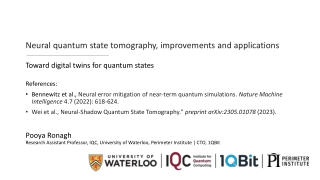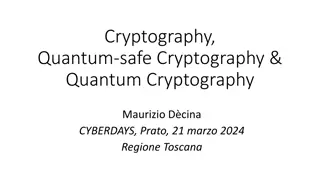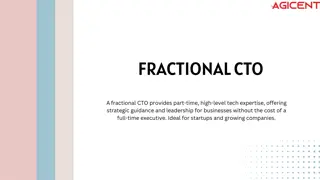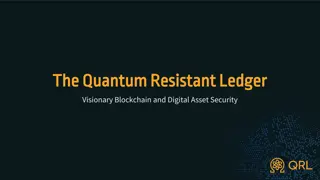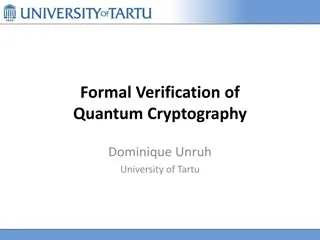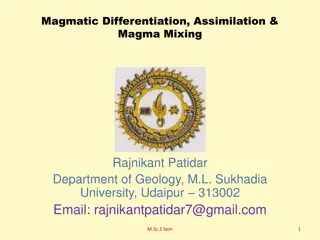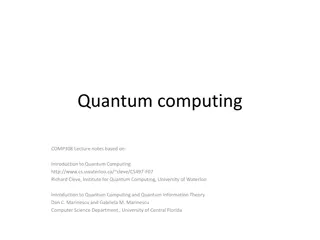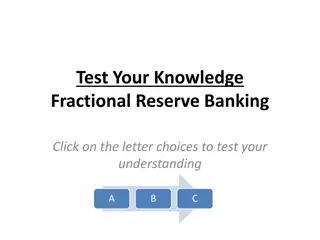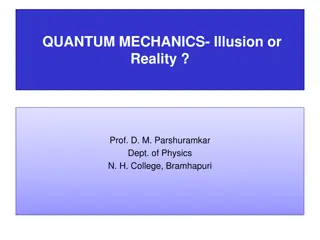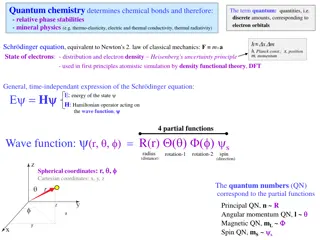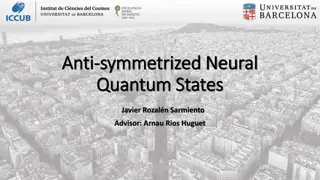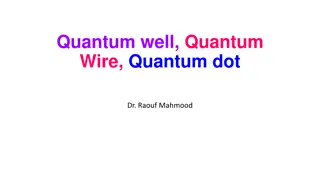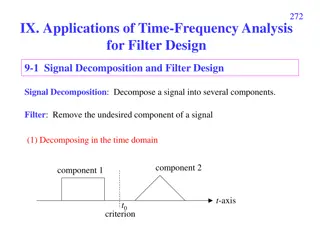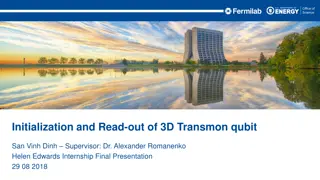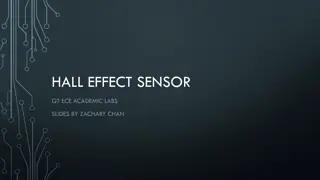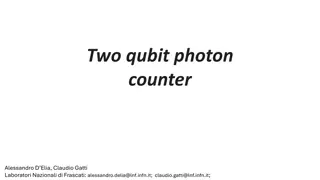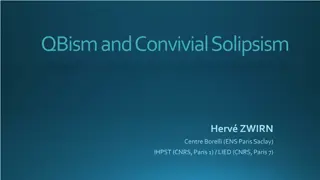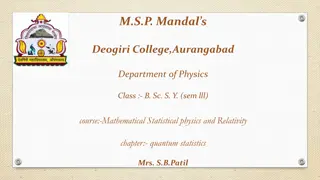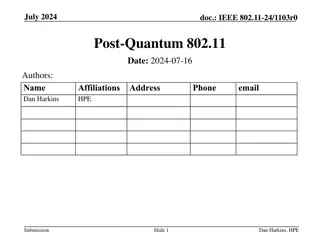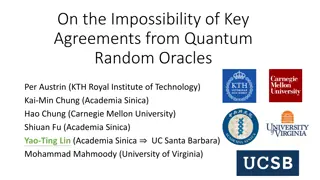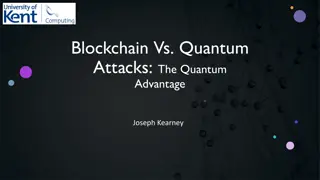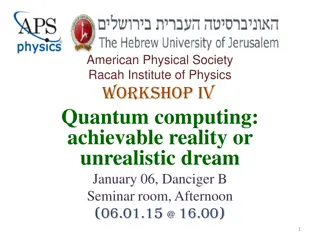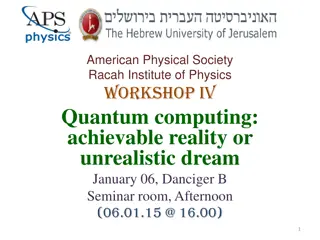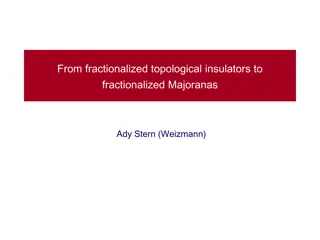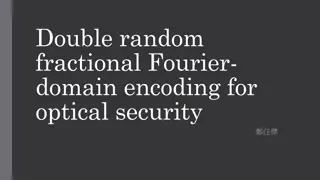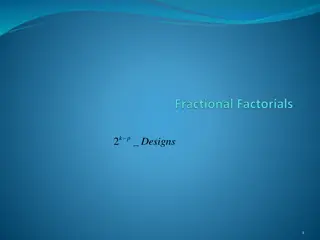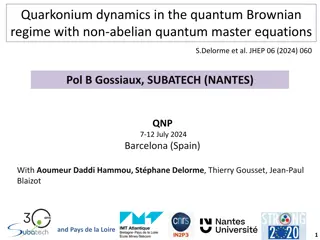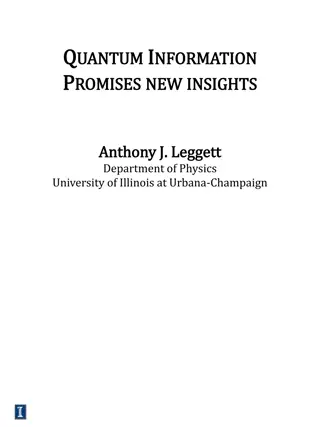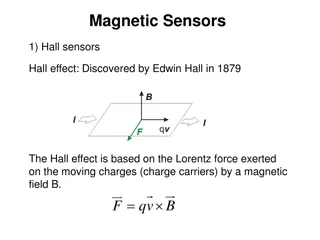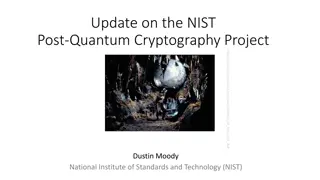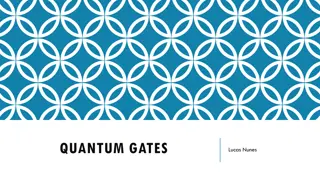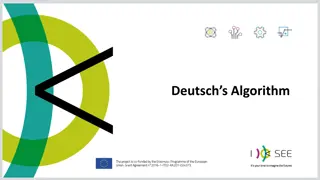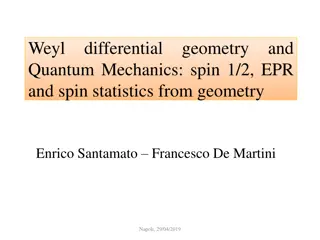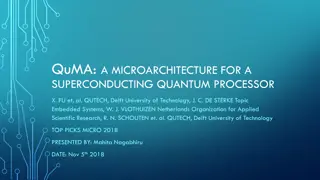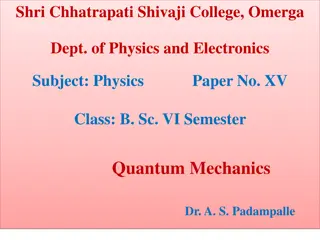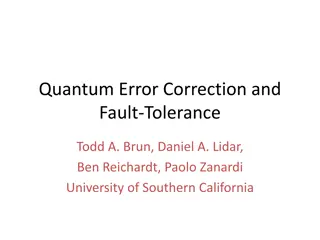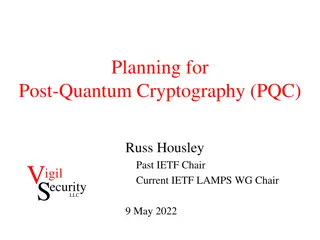Neural quantum state tomography, improvements and applications
Advancements and potential applications of neural quantum state tomography, aiming to reduce the exponential classical memory required for expressing quantum states. It discusses the benefits of using machine learning techniques to process and analyze quantum data, such as cleaning up states, manipu
4 views • 26 slides
Cryptography,.Quantum-safe Cryptography& Quantum Cryptography
Dive into the world of cryptography, quantum-safe cryptography, and quantum technology as discussed in Maurizio D. Cina's presentation at CYBERDAYS in Prato. Topics include current cryptosystems, post-quantum cryptography, quantum key distribution, and future cryptosystems based on quantum algorithm
5 views • 17 slides
CERN Quantum Technologies Initiative Overview
The CERN Quantum Technologies Initiative (QTI) aims to explore the impact of quantum technology on CERN's physics programs. This phase involves identifying key areas for collaboration, conducting scientific investigations, and building quantum capacity. The strategy and roadmap were developed with i
6 views • 14 slides
Fractional CTO for Startups: Key Responsibilities
A Fractional CTO provides part-time, high-level tech expertise, guiding your business in strategy, development, and growth without the cost of a full-time executive.\n\nVisit:- \/\/ \/fractional-cto\n
0 views • 6 slides
Addressing The Quantum Threat: The Quantum Resistant Ledger
The Quantum Resistant Ledger (QRL) is a visionary blockchain and digital asset security solution designed to counter the emerging threat of quantum computing. With quantum technology advancing and traditional blockchains at risk, QRL offers an industrial-grade, quantum computer-resistant cryptocurre
2 views • 9 slides
Formal Verification of Quantum Cryptography by Dominique Unruh
Explore the significance of formal verification in quantum cryptography as discussed by Dominique Unruh from the University of Tartu. Understand the challenges, motivations, and current work in verifying quantum crypto protocols, and the potential impact of quantum computers on common encryption met
0 views • 25 slides
Understanding Magmatic Differentiation and Magma Mixing
Magmatic differentiation is the process through which a single homogeneous magma can produce diverse rock types by generating fractions of different compositions. This variation in igneous rocks results from mechanisms like fractional crystallization, liquid immiscibility, vapor transport, and diffu
1 views • 29 slides
Introduction to Quantum Computing: Exploring the Future of Information Processing
Quantum computing revolutionizes information processing by leveraging quantum mechanics principles, enabling faster algorithms and secure code systems. Advancements in quantum information theory promise efficient distributed systems and combinatorial problem-solving. Discover the evolution of quantu
0 views • 68 slides
Near-Optimal Quantum Algorithms for String Problems - Summary and Insights
Near-Optimal Quantum Algorithms for String Problems by Ce Jin and Shyan Akmal presents groundbreaking research on string problem solutions using quantum algorithms. The study delves into various key topics such as Combinatorial Pattern Matching, Basic String Problems, Quantum Black-box Model, and mo
0 views • 25 slides
Understanding Fractional Reserve Banking Through Multiple-Choice Questions
Test your knowledge of fractional reserve banking with a series of questions covering topics such as its history, profit mechanisms for banks, the money supply, reserve requirements, excess reserves, and the impact of reserve ratio changes on the money supply. Explore concepts related to commercial
1 views • 12 slides
Exploring Quantum Mechanics: Illusion or Reality?
Delve into the fascinating realm of quantum mechanics with Prof. D. M. Parshuramkar as he discusses the contrast between classical and quantum mechanics. Discover how classical mechanics fails to predict the behavior of electrons in atoms and molecules, leading to the development of quantum mechanic
1 views • 70 slides
Understanding Quantum Chemistry and Electron Orbitals
Quantum chemistry plays a key role in determining chemical bonds, phase stabilities, and mineral physics through the study of electron orbitals, quantum numbers, and energy levels. This involves concepts such as the Schrödinger equation, quantum quantities, and the uncertainty principle. The arrang
0 views • 31 slides
Exploring Neural Quantum States and Symmetries in Quantum Mechanics
This article delves into the intricacies of anti-symmetrized neural quantum states and the application of neural networks in solving for the ground-state wave function of atomic nuclei. It discusses the setup using the Rayleigh-Ritz variational principle, neural quantum states (NQSs), variational pa
1 views • 15 slides
Understanding Quantum Wires and Nanowires: Properties and Applications
Quantum wires, quantum dots, and nanowires are essential components in nanotechnology due to their unique properties and applications. Quantum wires are one-dimensional systems with restricted electron movement, while quantum dots are zero-dimensional, limiting electron movement in all dimensions. N
3 views • 12 slides
Applications of Time-Frequency Analysis for Filter Design
Signal decomposition and filter design techniques are explored using time-frequency analysis. Signals can be decomposed in both time and frequency domains to extract desired components or remove noise. Various transform methods like the Fourier transform and fractional Fourier transform are employed
1 views • 35 slides
Exploring 3D Transmon Qubits in Quantum Computing
This document delves into the initialization, read-out, and measurement techniques of 3D transmon qubits as integral components of quantum computing. It covers the underlying principles of superconducting qubits, SRF cavity utilization, and the roadmap for improving quantum memory and coherence time
0 views • 12 slides
Understanding Hall Effect Sensors in Electronic Labs
Hall Effect sensors play a crucial role in detecting magnetic fields, enabling applications such as current sensing, rotational speed measurement in motors, and magnetic proximity sensing. They operate based on the Hall Effect phenomenon, where a magnetic field influences the flow of current in a se
2 views • 5 slides
Understanding the Hall Effect in Conductors
The Hall Effect in conductors is described in detail, showcasing how a magnetic field affects the conductivity tensor, breaking symmetry and leading to unique properties. The discussion covers the separation of the conductivity tensor, the impact of magnetic fields on conductivity components, and th
1 views • 16 slides
Quantum Circuit Simulations and Electromagnetic Analyses in Quantum Photonics
Explore the world of quantum photonics with insights into two-qubit photon counters, jointed cavities, qubit pads, and quantum circuit simulations. Ansys simulations and experimental data by researchers Alessandro D'Elia and Claudio Gatti provide in-depth analysis of quantum phenomena. Discover the
0 views • 7 slides
QBism and Convivial Solipsism in Quantum Interpretations
QBism and Convivial Solipsism present different interpretations of quantum mechanics, focusing on the subjective nature of probabilities and experiences within the quantum formalism. QBism emphasizes the subjective interpretation of probability, considering the quantum state as a tool for assigning
0 views • 30 slides
Development of Quantum Statistics in Quantum Mechanics
The development of quantum statistics plays a crucial role in understanding systems with a large number of identical particles. Symmetric and anti-symmetric wave functions are key concepts in quantum statistics, leading to the formulation of Bose-Einstein Statistics for bosons and Fermi-Dirac Statis
1 views • 15 slides
Post-Quantum Cryptography in IEEE 802.11 - Current State and Future Concerns
Submission discusses the potential impact of post-quantum algorithms on IEEE 802.11 networks, highlighting the necessity to prepare for a post-quantum future. It explores the risks posed by quantum computing to existing cryptographic systems and emphasizes the importance of adopting post-quantum sol
0 views • 19 slides
Quantum Key Agreements and Random Oracles
This academic paper explores the impossibility of achieving key agreements using quantum random oracles, discussing the challenges and limitations in quantum communication, cryptographic protocols, quantum computation, and classical communication. The study delves into the implications of quantum ra
0 views • 29 slides
Understanding Blockchain Vulnerabilities to Quantum Attacks
Explore the vulnerabilities of blockchains to quantum attacks and the potential impact of quantum devices on blockchain technologies. Learn about key concepts such as blockchain basics, proof-of-work, quantum computing, quantum computing algorithms, and vulnerabilities like ECDSA and peer-to-peer ne
0 views • 23 slides
Quantum Computing: Achievable Reality or Unrealistic Dream Workshop
Explore the intriguing realm of quantum computing through insightful lectures by Prof. Gil Kalai and Prof. Nadav Katz at the American Physical Society workshop. Delve into the possibilities, failures, and advancements in quantum information science. Join the discussion on the state-of-the-art develo
0 views • 13 slides
Insights on Quantum Computing: Bridging Theory and Reality
Delve into the world of quantum computing through a series of workshops and personal reflections. Explore the intersection of theoretical concepts with practical applications, highlighting the evolving landscape of quantum mechanics. The journey navigates discussions on electron spin, fundamental th
0 views • 12 slides
Exploring Fractionalized Topological Insulators and Majoranas
This discussion delves into the transition from fractionalized topological insulators to fractionalized Majorana modes, highlighting key concepts in topological phases of matter, quantum Hall effects, and interactions in fractional quantum Hall effects. Emphasis is placed on 3D topological insulator
0 views • 23 slides
Optical Security with Double Random Fractional Fourier Domain Encoding
Utilizing double random fractional Fourier domain encoding for optical security involves encryption and decryption methods based on the fractional Fourier transform of various orders, involving specific mathematical operations and notations. The process includes transforming the input function, encr
0 views • 13 slides
Understanding Fractional Factorials in Experimental Designs
Explore the concept of fractional factorials in experimental designs, including the basics, factors, terms estimation, confounding, and practical considerations for running treatment combinations. Learn how to generate incomplete blocks, use orthogonal contrasts, identify confounded terms, and alloc
0 views • 24 slides
Quantum Brownian Regime in Quarkonium Dynamics: Insights and Applications
Exploring quarkonium dynamics in the quantum Brownian regime using non-abelian quantum master equations reveals crucial aspects such as regeneration processes, quarkonia at finite temperature, and distinct regimes based on spectral density and dissociation mechanisms. The study delves into quantum m
0 views • 44 slides
Exploring Quantum Information through Polarization of Photons
Quantum information and photon polarization are explored in this detailed presentation featuring the ultimate quantum 2-state system. The content delves into the behavior of single photons at a quantum level, showcasing the intriguing properties and implications of quantum superposition in polarizat
1 views • 14 slides
Understanding Hall Effect in Magnetic Sensors
The Hall effect, discovered by Edwin Hall in 1879, is utilized in magnetic sensors to detect magnetic fields by measuring the Lorentz force on moving charges. Hall sensors generate a Hall voltage based on the positive and negative charge carriers present. Integrated Hall sensors provide detailed spe
0 views • 10 slides
Understanding Quantum Computing and Its Impact on Cryptography
Quantum computing utilizes the principles of quantum mechanics to process information exponentially faster than classical computers. This advancement poses a significant threat to current cryptographic systems, especially those reliant on factors like RSA and Diffie-Hellman key exchange. If large-sc
0 views • 25 slides
Understanding Quantum Computing: Quantum Gates, Bits, and Applications
Explore the world of quantum computing with this detailed guide covering quantum bits, gates, their applications, and the advancements made in the field. From classical bits to qubits, Bell states, and quantum gates, discover the fundamental principles that drive quantum computing forward.
0 views • 37 slides
Understanding Deutsch's Algorithm in Quantum Computing
Deutsch's Algorithm is a fundamental quantum algorithm designed to solve the problem of determining if a given function is constant or balanced. This algorithm leverages quantum principles such as superposition and entanglement to provide a more efficient solution compared to classical methods. By e
0 views • 17 slides
Quantum Mechanics and Geometric Interpretations in Weyl Space
The discussion explores Weyl quantum mechanics, Bohm's interpretation of quantum potential, and geometric formulations in Euclidean-Weyl space. It delves into the implications of nonlocal quantum potentials and the nature of metric spaces in shaping quantum phenomena. Concluding with alternative vie
0 views • 30 slides
Overview of QuMA: A Microarchitecture for a Superconducting Quantum Processor
This paper introduces QuMA, a quantum microarchitecture that bridges the gap between high-level algorithms and the quantum physical layer. It defines a multi-layered system stack for quantum computers, focusing on compiler support, quantum error correction, and the need for a micro-architecture fram
0 views • 21 slides
Unveiling the Quantum World: Understanding Blackbody Radiation and Quantum Mechanics
Quantum Mechanics emerged between 1900 and 1930 as a revolutionary theory explaining the behavior of microscopic particles. This article delves into the need for Quantum Physics due to classical mechanics' limitations, focusing on Blackbody Radiation and laws governing it like Wiens Displacement Law
1 views • 30 slides
Quantum Error Correction and Fault Tolerance Overview
Quantum error correction and fault tolerance are essential for realizing quantum computers due to the challenge of decoherence. Various approaches, including concatenated quantum error correcting codes and topological codes like the surface code, are being studied for fault-tolerant quantum computin
0 views • 19 slides
Securing Communication in the Quantum Computing Era
Embracing Post-Quantum Cryptography (PQC) is essential to counter the threat posed by large-scale quantum computers to current public key cryptosystems. Russ Housley, a prominent figure in the field, highlights the urgency to deploy PQC algorithms before a quantum computing breakthrough occurs. The
0 views • 9 slides
